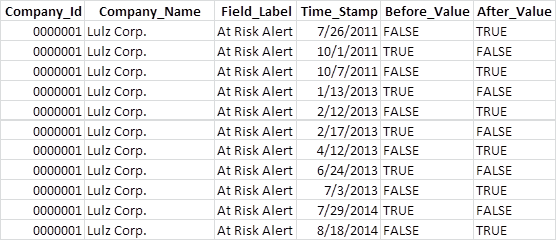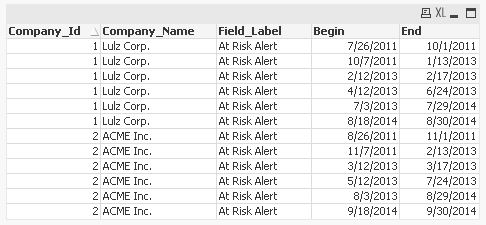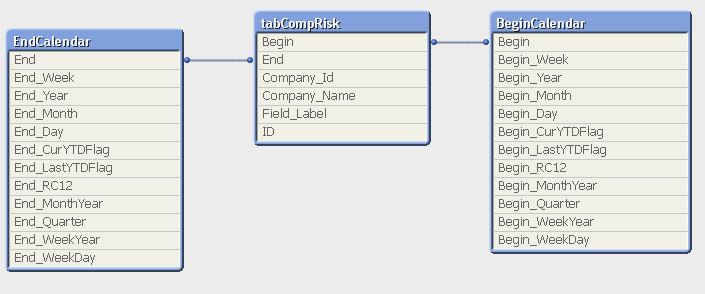Unlock a world of possibilities! Login now and discover the exclusive benefits awaiting you.
- Qlik Community
- :
- All Forums
- :
- QlikView App Dev
- :
- Re: Re: Start date and end date in two different r...
- Subscribe to RSS Feed
- Mark Topic as New
- Mark Topic as Read
- Float this Topic for Current User
- Bookmark
- Subscribe
- Mute
- Printer Friendly Page
- Mark as New
- Bookmark
- Subscribe
- Mute
- Subscribe to RSS Feed
- Permalink
- Report Inappropriate Content
Start date and end date in two different rows
Hey Qlikview community,
I'm working on a dashboard project with the capability of analyzing customer alerts over time, so I'll need the end dates and start dates of alerts. Unfortunately, the way this stored in the DB is unusual. I see the logic of how to do it, but can't quite translate it into a Qlikview script.
Here's the information I have. A company can only have one alert active at a time. An alert's beginning date is the time stamp where before = false and after = true. The end date is the time stamp where before = true and after = false.

Sorting by company, and then by time stamp, it would be simple to manually copy and paste the time stamps to a new column "Begin" and a new column "End," creating records like below:

The real data has hundreds of companies' alerts, not just Lulz Corp. Any ideas on how this might be accomplished with a Qlikview script? Thanks!
- Tags:
- qlikview_scripting
Accepted Solutions
- Mark as New
- Bookmark
- Subscribe
- Mute
- Subscribe to RSS Feed
- Permalink
- Report Inappropriate Content
Hi,
maybe like this:

tabInput:
LOAD * Inline [
Company_Id, Company_Name, Field_Label, Time_Stamp, Before_Value, After_Value
1, Lulz Corp., At Risk Alert, 7/26/2011, FALSE, TRUE
1, Lulz Corp., At Risk Alert, 10/1/2011, TRUE, FALSE
1, Lulz Corp., At Risk Alert, 10/7/2011, FALSE, TRUE
1, Lulz Corp., At Risk Alert, 1/13/2013, TRUE, FALSE
1, Lulz Corp., At Risk Alert, 2/12/2013, FALSE, TRUE
1, Lulz Corp., At Risk Alert, 2/17/2013, TRUE, FALSE
1, Lulz Corp., At Risk Alert, 4/12/2013, FALSE, TRUE
1, Lulz Corp., At Risk Alert, 6/24/2013, TRUE, FALSE
1, Lulz Corp., At Risk Alert, 7/3/2013, FALSE, TRUE
1, Lulz Corp., At Risk Alert, 7/29/2014, TRUE, FALSE
1, Lulz Corp., At Risk Alert, 8/18/2014, FALSE, TRUE
1, Lulz Corp., At Risk Alert, 8/30/2014, TRUE, FALSE
2, ACME Inc., At Risk Alert, 8/26/2011, FALSE, TRUE
2, ACME Inc., At Risk Alert, 11/1/2011, TRUE, FALSE
2, ACME Inc., At Risk Alert, 11/7/2011, FALSE, TRUE
2, ACME Inc., At Risk Alert, 2/13/2013, TRUE, FALSE
2, ACME Inc., At Risk Alert, 3/12/2013, FALSE, TRUE
2, ACME Inc., At Risk Alert, 3/17/2013, TRUE, FALSE
2, ACME Inc., At Risk Alert, 5/12/2013, FALSE, TRUE
2, ACME Inc., At Risk Alert, 7/24/2013, TRUE, FALSE
2, ACME Inc., At Risk Alert, 8/3/2013, FALSE, TRUE
2, ACME Inc., At Risk Alert, 8/29/2014, TRUE, FALSE
2, ACME Inc., At Risk Alert, 9/18/2014, FALSE, TRUE
2, ACME Inc., At Risk Alert, 9/30/2014, TRUE, FALSE
];
tabTemp:
LOAD RangeSum(Peek(ID),-(not Before and After)) as ID,
Company_Id,
Company_Name,
Field_Label,
If(not Before and After, 'Begin', If(Before and not After, 'End')) as Time_Stamp_Type,
Time_Stamp;
LOAD *,
Evaluate(Before_Value&'()') as Before,
Evaluate(After_Value&'()') as After
Resident tabInput
Order By Company_Id, Company_Name, Field_Label, Time_Stamp;
tabOutput:
Generic LOAD * Resident tabTemp;
DROP Table tabInput, tabTemp;
hope this helps
regards
Marco
- Mark as New
- Bookmark
- Subscribe
- Mute
- Subscribe to RSS Feed
- Permalink
- Report Inappropriate Content
a generic load with some conditions should work
- Mark as New
- Bookmark
- Subscribe
- Mute
- Subscribe to RSS Feed
- Permalink
- Report Inappropriate Content
Not sure if generic load will work, but otherwise you could do something like this. See attached file as well.
Data:
Load
Company_Id,
Company_Name,
Field_Label,
date#(Time_Stamp,'MM/DD/YYYY') as Time_Stamp,
Before_Value,
After_Value
INLINE [
Company_Id, Company_Name, Field_Label, Time_Stamp, Before_Value, After_Value
1, Lulz Corp., At Risk Alert, 7/26/2011, FALSE, TRUE
1, Lulz Corp., At Risk Alert, 10/1/2011, TRUE, FALSE
1, Lulz Corp., At Risk Alert, 10/7/2011, FALSE, TRUE
1, Lulz Corp., At Risk Alert, 1/13/2013, TRUE, FALSE
1, Lulz Corp., At Risk Alert, 2/12/2013, FALSE, TRUE
1, Lulz Corp., At Risk Alert, 2/17/2013, TRUE, FALSE
2, Second Corp., At Risk Alert, 7/26/2011, FALSE, TRUE
2, Second Corp., At Risk Alert, 10/1/2011, TRUE, FALSE
2, Second Corp., At Risk Alert, 10/7/2011, FALSE, TRUE
2, Second Corp., At Risk Alert, 1/13/2013, TRUE, FALSE
2, Second Corp., At Risk Alert, 2/12/2013, FALSE, TRUE
2, Second Corp., At Risk Alert, 2/17/2013, TRUE, FALSE
];
Tmp:
Load
*,
if(Company_Id=previous(Company_Id) and previous(After_Value)='TRUE', previous(Time_Stamp)) as StartDate,
Time_Stamp as EndDate
resident Data where Before_Value='TRUE' order by Company_Id, Time_Stamp asc;
drop table Data;
- Mark as New
- Bookmark
- Subscribe
- Mute
- Subscribe to RSS Feed
- Permalink
- Report Inappropriate Content
result

script
a1:
load * INLINE [
Company_Id, Company_Name, Field_Label, Time_Stamp, Before_Value, After_Value
1, Lulz Corp., At Risk Alert, 7/26/2011, FALSE, TRUE
1, Lulz Corp., At Risk Alert, 10/1/2011, TRUE, FALSE
1, Lulz Corp., At Risk Alert, 10/7/2011, FALSE, TRUE
1, Lulz Corp., At Risk Alert, 1/13/2013, TRUE, FALSE
1, Lulz Corp., At Risk Alert, 2/12/2013, FALSE, TRUE
1, Lulz Corp., At Risk Alert, 2/17/2013, TRUE, FALSE
1, Lulz Corp., At Risk Alert, 4/12/2013, FALSE, TRUE
1, Lulz Corp., At Risk Alert, 6/24/2013, TRUE, FALSE
1, Lulz Corp., At Risk Alert, 7/3/2013, FALSE, TRUE
1, Lulz Corp., At Risk Alert, 7/29/2014, TRUE, FALSE
1, Lulz Corp., At Risk Alert, 8/18/2014, FALSE, TRUE
1, Lulz Corp., At Risk Alert, 8/19/2014, TRUE, FALSE
];
a: noconcatenate
load if(even(rowno()), rowno()-1, rowno()) as id, rowno() as id2, *
Resident a1 order by Company_Id, Time_Stamp;
drop table a1;
t:
noconcatenate
load id, Company_Id, Company_Name, Field_Label, Time_Stamp as End//, Before_Value, After_Value
Resident a
where Before_Value = 'TRUE' and After_Value='FALSE';
join (t)
load id, Company_Id, Time_Stamp as Start //, Before_Value, After_Value
Resident a
where Before_Value = 'FALSE' and After_Value='TRUE';
drop table a;
- Mark as New
- Bookmark
- Subscribe
- Mute
- Subscribe to RSS Feed
- Permalink
- Report Inappropriate Content
Hi,
maybe like this:

tabInput:
LOAD * Inline [
Company_Id, Company_Name, Field_Label, Time_Stamp, Before_Value, After_Value
1, Lulz Corp., At Risk Alert, 7/26/2011, FALSE, TRUE
1, Lulz Corp., At Risk Alert, 10/1/2011, TRUE, FALSE
1, Lulz Corp., At Risk Alert, 10/7/2011, FALSE, TRUE
1, Lulz Corp., At Risk Alert, 1/13/2013, TRUE, FALSE
1, Lulz Corp., At Risk Alert, 2/12/2013, FALSE, TRUE
1, Lulz Corp., At Risk Alert, 2/17/2013, TRUE, FALSE
1, Lulz Corp., At Risk Alert, 4/12/2013, FALSE, TRUE
1, Lulz Corp., At Risk Alert, 6/24/2013, TRUE, FALSE
1, Lulz Corp., At Risk Alert, 7/3/2013, FALSE, TRUE
1, Lulz Corp., At Risk Alert, 7/29/2014, TRUE, FALSE
1, Lulz Corp., At Risk Alert, 8/18/2014, FALSE, TRUE
1, Lulz Corp., At Risk Alert, 8/30/2014, TRUE, FALSE
2, ACME Inc., At Risk Alert, 8/26/2011, FALSE, TRUE
2, ACME Inc., At Risk Alert, 11/1/2011, TRUE, FALSE
2, ACME Inc., At Risk Alert, 11/7/2011, FALSE, TRUE
2, ACME Inc., At Risk Alert, 2/13/2013, TRUE, FALSE
2, ACME Inc., At Risk Alert, 3/12/2013, FALSE, TRUE
2, ACME Inc., At Risk Alert, 3/17/2013, TRUE, FALSE
2, ACME Inc., At Risk Alert, 5/12/2013, FALSE, TRUE
2, ACME Inc., At Risk Alert, 7/24/2013, TRUE, FALSE
2, ACME Inc., At Risk Alert, 8/3/2013, FALSE, TRUE
2, ACME Inc., At Risk Alert, 8/29/2014, TRUE, FALSE
2, ACME Inc., At Risk Alert, 9/18/2014, FALSE, TRUE
2, ACME Inc., At Risk Alert, 9/30/2014, TRUE, FALSE
];
tabTemp:
LOAD RangeSum(Peek(ID),-(not Before and After)) as ID,
Company_Id,
Company_Name,
Field_Label,
If(not Before and After, 'Begin', If(Before and not After, 'End')) as Time_Stamp_Type,
Time_Stamp;
LOAD *,
Evaluate(Before_Value&'()') as Before,
Evaluate(After_Value&'()') as After
Resident tabInput
Order By Company_Id, Company_Name, Field_Label, Time_Stamp;
tabOutput:
Generic LOAD * Resident tabTemp;
DROP Table tabInput, tabTemp;
hope this helps
regards
Marco
- Mark as New
- Bookmark
- Subscribe
- Mute
- Subscribe to RSS Feed
- Permalink
- Report Inappropriate Content
Thank you gentlemen! All of your answers worked on the example data I gave, but the answer I selected handled open alerts (that is, alerts with only a beginning date) better.
I really appreciate it!
- Mark as New
- Bookmark
- Subscribe
- Mute
- Subscribe to RSS Feed
- Permalink
- Report Inappropriate Content
EDIT: NEVERMIND. Thanks!
- Mark as New
- Bookmark
- Subscribe
- Mute
- Subscribe to RSS Feed
- Permalink
- Report Inappropriate Content
Hi,
I already worked on it before seeing your edit:
Using some wonderful code from Rob Wunderlich I combined the generic tables into one.
I also changed your calendar script a bit.
The result looks like this:

tabInput:
LOAD * Inline [
Company_Id, Company_Name, Field_Label, Time_Stamp, Before_Value, After_Value
1, Lulz Corp., At Risk Alert, 7/26/2011, FALSE, TRUE
1, Lulz Corp., At Risk Alert, 10/1/2011, TRUE, FALSE
1, Lulz Corp., At Risk Alert, 10/7/2011, FALSE, TRUE
1, Lulz Corp., At Risk Alert, 1/13/2013, TRUE, FALSE
1, Lulz Corp., At Risk Alert, 2/12/2013, FALSE, TRUE
1, Lulz Corp., At Risk Alert, 2/17/2013, TRUE, FALSE
1, Lulz Corp., At Risk Alert, 4/12/2013, FALSE, TRUE
1, Lulz Corp., At Risk Alert, 6/24/2013, TRUE, FALSE
1, Lulz Corp., At Risk Alert, 7/3/2013, FALSE, TRUE
1, Lulz Corp., At Risk Alert, 7/29/2014, TRUE, FALSE
1, Lulz Corp., At Risk Alert, 8/18/2014, FALSE, TRUE
1, Lulz Corp., At Risk Alert, 8/30/2014, TRUE, FALSE
2, ACME Inc., At Risk Alert, 8/26/2011, FALSE, TRUE
2, ACME Inc., At Risk Alert, 11/1/2011, TRUE, FALSE
2, ACME Inc., At Risk Alert, 11/7/2011, FALSE, TRUE
2, ACME Inc., At Risk Alert, 2/13/2013, TRUE, FALSE
2, ACME Inc., At Risk Alert, 3/12/2013, FALSE, TRUE
2, ACME Inc., At Risk Alert, 3/17/2013, TRUE, FALSE
2, ACME Inc., At Risk Alert, 5/12/2013, FALSE, TRUE
2, ACME Inc., At Risk Alert, 7/24/2013, TRUE, FALSE
2, ACME Inc., At Risk Alert, 8/3/2013, FALSE, TRUE
2, ACME Inc., At Risk Alert, 8/29/2014, TRUE, FALSE
2, ACME Inc., At Risk Alert, 9/18/2014, FALSE, TRUE
2, ACME Inc., At Risk Alert, 9/30/2014, TRUE, FALSE
];
tabTemp:
LOAD RangeSum(Peek(ID),-(not Before and After)) as ID,
Company_Id,
Company_Name,
Field_Label,
If(not Before and After, 'Begin', If(Before and not After, 'End')) as Time_Stamp_Type,
Date(Time_Stamp,'MM/DD/YYYY');
LOAD *,
Evaluate(Before_Value&'()') as Before,
Evaluate(After_Value&'()') as After
Resident tabInput
Order By Company_Id, Company_Name, Field_Label, Time_Stamp;
tabCompRisk:
LOAD Distinct ID Resident tabTemp;
tabOutput:
Generic LOAD * Resident tabTemp;
DROP Table tabInput, tabTemp;
FOR i = NoOfTables()-1 to 0 STEP -1
LET vTable=TableName($(i));
IF WildMatch('$(vTable)', 'tabOutput.*') THEN
LEFT JOIN (tabCompRisk) LOAD * RESIDENT [$(vTable)];
DROP TABLE [$(vTable)];
ENDIF
NEXT i
BeginCalendar:
Load Begin,
Week(Begin) As Begin_Week,
Year(Begin) As Begin_Year,
Month(Begin) As Begin_Month,
Day(Begin) As Begin_Day,
YeartoDate(Begin)*-1 as Begin_CurYTDFlag,
YeartoDate(Begin,-1)*-1 as Begin_LastYTDFlag,
InYear(Begin, Monthstart(maxDate),-1) as Begin_RC12,
Date(MonthStart(Begin), 'MMM-YYYY') as Begin_MonthYear,
Dual('Q'&Ceil(Month(Begin)/3),Ceil(Month(Begin)/3)) as Begin_Quarter,
Dual(Week(WeekStart(Begin))&'-'&WeekYear(Begin),WeekStart(Begin)) as Begin_WeekYear,
WeekDay(Begin) as Begin_WeekDay;
LOAD Date(minDate+IterNo()-1) as Begin,
maxDate
While minDate+IterNo()-1<=maxDate;
LOAD Min(Begin) as minDate,
Max(Begin) as maxDate
Resident tabCompRisk;
EndCalendar:
Load End,
Week(End) As End_Week,
Year(End) As End_Year,
Month(End) As End_Month,
Day(End) As End_Day,
YeartoDate(End)*-1 as End_CurYTDFlag,
YeartoDate(End,-1)*-1 as End_LastYTDFlag,
InYear(End, Monthstart(maxDate),-1) as End_RC12,
Date(MonthStart(End), 'MMM-YYYY') as End_MonthYear,
Dual('Q'&Ceil(Month(End)/3),Ceil(Month(End)/3)) as End_Quarter,
Dual(Week(WeekStart(End))&'-'&WeekYear(End),WeekStart(End)) as End_WeekYear,
WeekDay(End) as End_WeekDay;
LOAD Date(minDate+IterNo()-1) as End,
maxDate
While minDate+IterNo()-1<=maxDate;
LOAD Min(End) as minDate,
Max(End) as maxDate
Resident tabCompRisk;
hope it helps nevertheless
regards
Marco